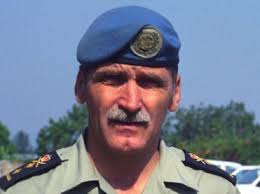One of the movies based on the experience of Canadian General Roméo Dallaire, former commander of the Blue Helmets in Rwanda during the genocide denounces the complicity of the United Nations in the tragedy that was compounded by the faltering response of the international community.
Dallaire now retired returned to Rwanda earlier this week to pursue initiatives connected to his ‘Romeo Dallaire Child Soldiers Initiative’ an organisation that trains security organs (military and police) on preventing the recruitment and use of child soldiers.
On Thursday he paid tribute to the victims of the 1994 genocide against the Tutsis, laying a wreath at the Kigali Genocide Memorial.
In his book, retired Lieutenant-General Roméo Dallaire describes the complicity of the UN and the international community in ignoring the information he provided on the preparations for the genocide in Rwanda sometime before the outbreak of the tragedy.
“The international community, including the US State Department, the Belgian authorities and several senior UN officials in New York were well aware of a crisis situation that prevailed in Rwanda at the time. They did nothing when I asked them to send an extra force to stop the genocide in preparation” says Dallaire in his book.
Born in the Netherlands in 1946, General Dallaire and his mother emigrated to Canada when he was six months old.
He would later join the Canadian army but he is best known for being the commander in chief of the troops of the United Nations Assistance Mission for Rwanda (UNAMIR) that was established by UN Security Council Resolution 872 on 5 October 1993.
It was intended to assist in the implementation of the Arusha Accords, signed on 4 August 1993, which was meant to implement the ceasefire agreements between the Rwandan government and the former rebel movement of the Rwanda Patriotic Front (now ruling RPF).
According to him, it was possible to halt the genocide that claimed the lives of more than one million people, mostly Tutsis and moderate Hutus, if the logistics and troop strength had been increased.
Helpless before the spectacle of this descent into hell, Gen. Dallaire was unable to immediately resign and leave Rwanda.
Rather than undertake innovative and potentially costly ways to halt the mass slaughter, international leaders and the U.N. staff treated the extermination campaign as an unfortunate consequence of the war and devoted their energies on trying to obtain a cease-fire between the belligerents.
They waited two weeks before taking action and then it was to reduce the number of peacekeepers in Rwanda to the consternation of the rest of the world.
In the meantime, UNAMIR forces had only the mandate to use force in self-defense, which was defined as including “resistance to attempts by forceful means to prevent the force from discharging its duties”.
In addition to lacking supplies, UNAMIR was short on qualified, experienced troops; a problem which Gen. Dallaire had repeatedly asked his superiors to remedy.
According to him, the failure by the United Nations to prevent, and subsequently stop the genocide in Rwanda was a failure by the United Nations system as a whole.
“There was a persistent lack of political will by member States to act, or to act with enough assertiveness,” the retired Canadian General adds.
CU/as/APA


